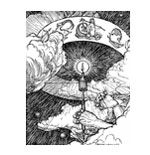
The Two Worlds of John Henry Newman
THE SEEN & THE UNSEEN
On October 2, 2008, his grave was opened. No scrap of his flesh, no chip of his bone was found. The total content of the grave was a bronze nameplate, a few bronze casket handles, and two tassels from his cardinal’s galero. And yet, one year ago, on September 19, 2010, Pope Benedict XVI at Birmingham, England, declared him to be “blessed,” a living, Christian hero. Before returning to the Vatican, Pope Benedict described John Henry Newman to be of the caliber of a Doctor of the Church, a title previously reserved for thirty men and three women who are honored by the Catholic Church, not alone as saints, but also as extraordinary intellectuals and authors. There is no trace remaining of Newman’s existence on planet earth, so where is he? The Church believes that he is among the blessed with God in Heaven, in another world, as real as our own world of sensation, though not seen.
John Henry Newman wrote and preached about this world in a sermon he entitled “The Invisible World” (Parochial and Plain Sermons, vol. 4; sermon 13). He first preached it in the Anglican parish church of his sister Harriet and her husband, Tom Mozley, in the town of Cholderton, Wiltshire. Newman took as his text for this sermon a passage from 2 Corinthians: “We look not at the things which are seen, but at the things which are not seen. For the things which are seen are temporal: but the things which are not seen, are eternal” (2 Cor. 4:18).
He starts by reminding us that we profess our faith in this unseen world each time we recite the Creed at Sunday Mass. “There are two worlds, ‘the visible and the invisible,’ as the Creed speaks, the world we see and the world we do not see; and the world we do not see exists as really as the world which we see.” Yet the world which we see appears so real to our senses that “it seems to leave no room for any other world.” Newman rejects the notion held by many that this “other” world does not exist at this present moment, but begins after death: “No: it exists now, though we see it not.”
You May Also Enjoy
Mankind exhibits a passion for knowledge and freedom, and an inveterate tendency to be seduced by counterfeits of knowledge and freedom.
As a historian of science and a philosopher he fought against the encroachments of scientism; as a theologian he fought to defend the supernatural.
Through the joys and perils of liberal learning we must ever recollect that only faith seeking understanding properly disposes the intellect toward conformity to Christ.

